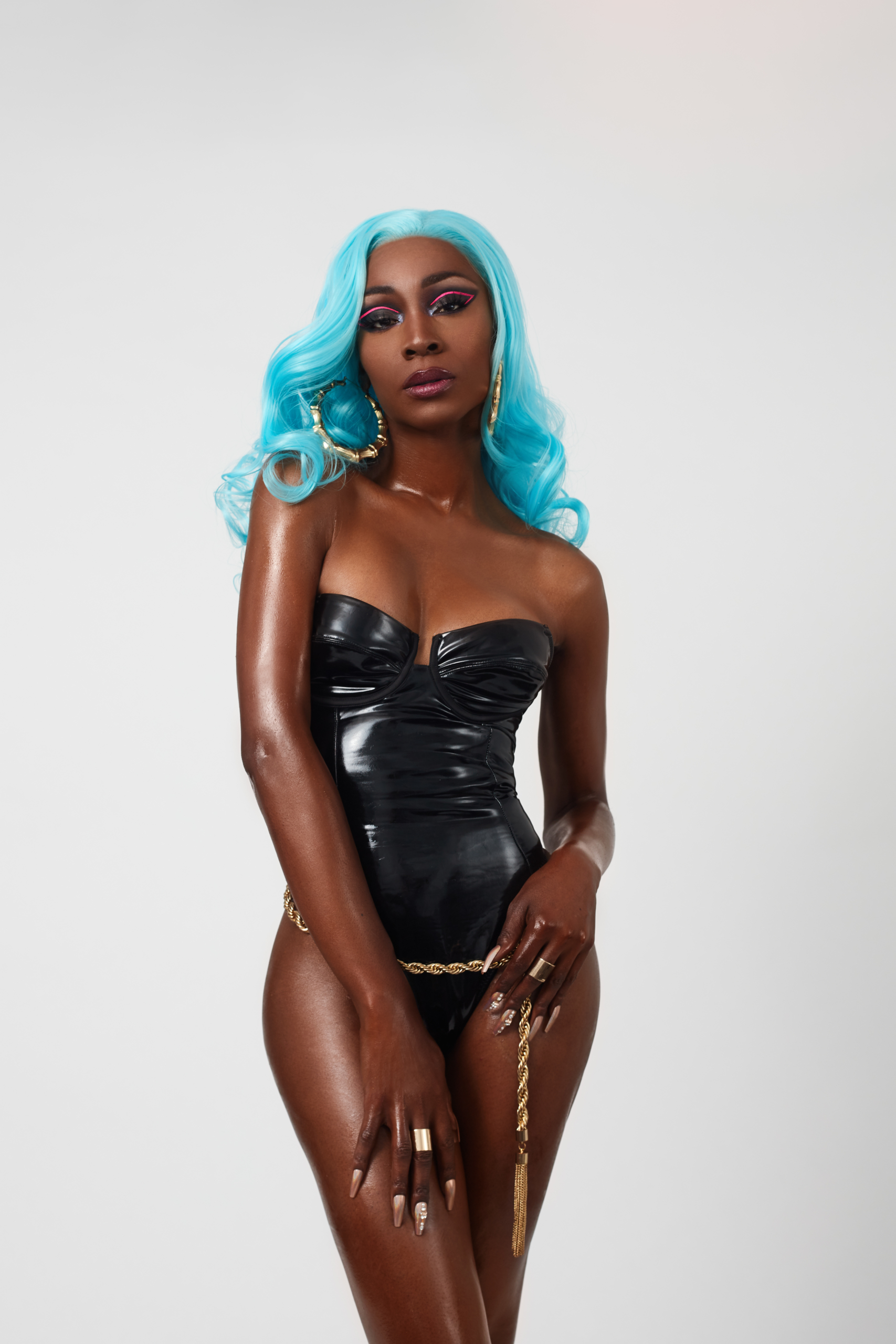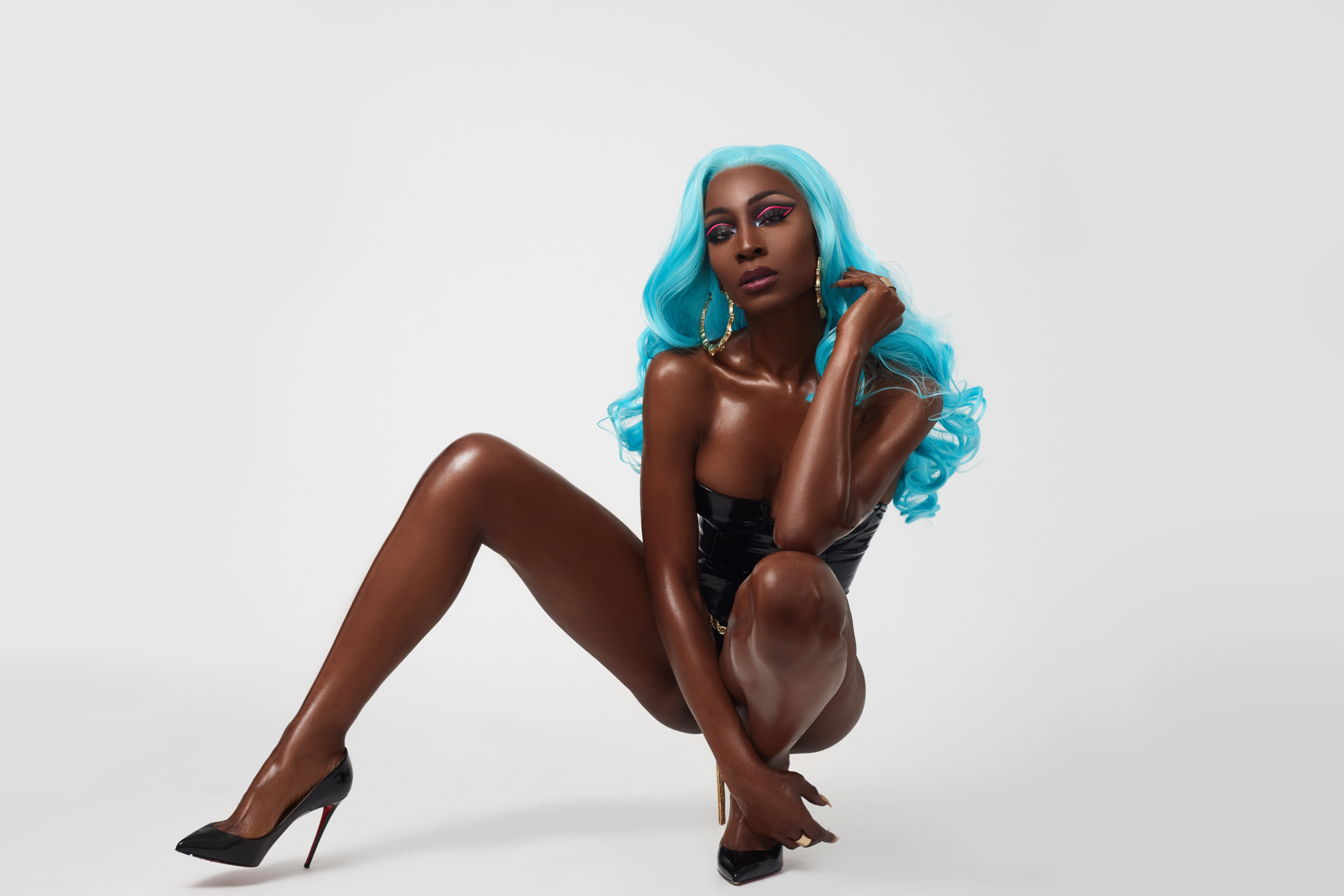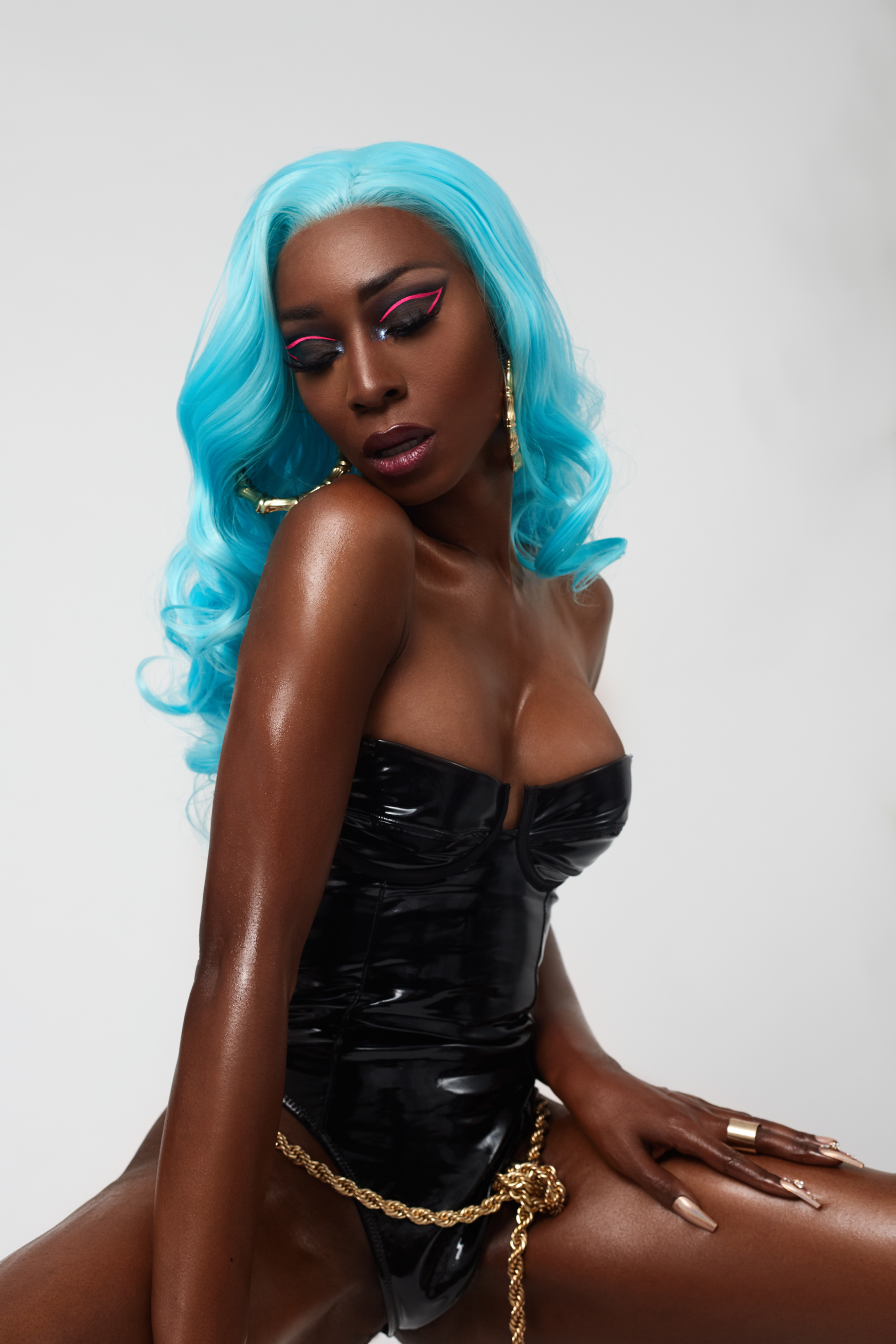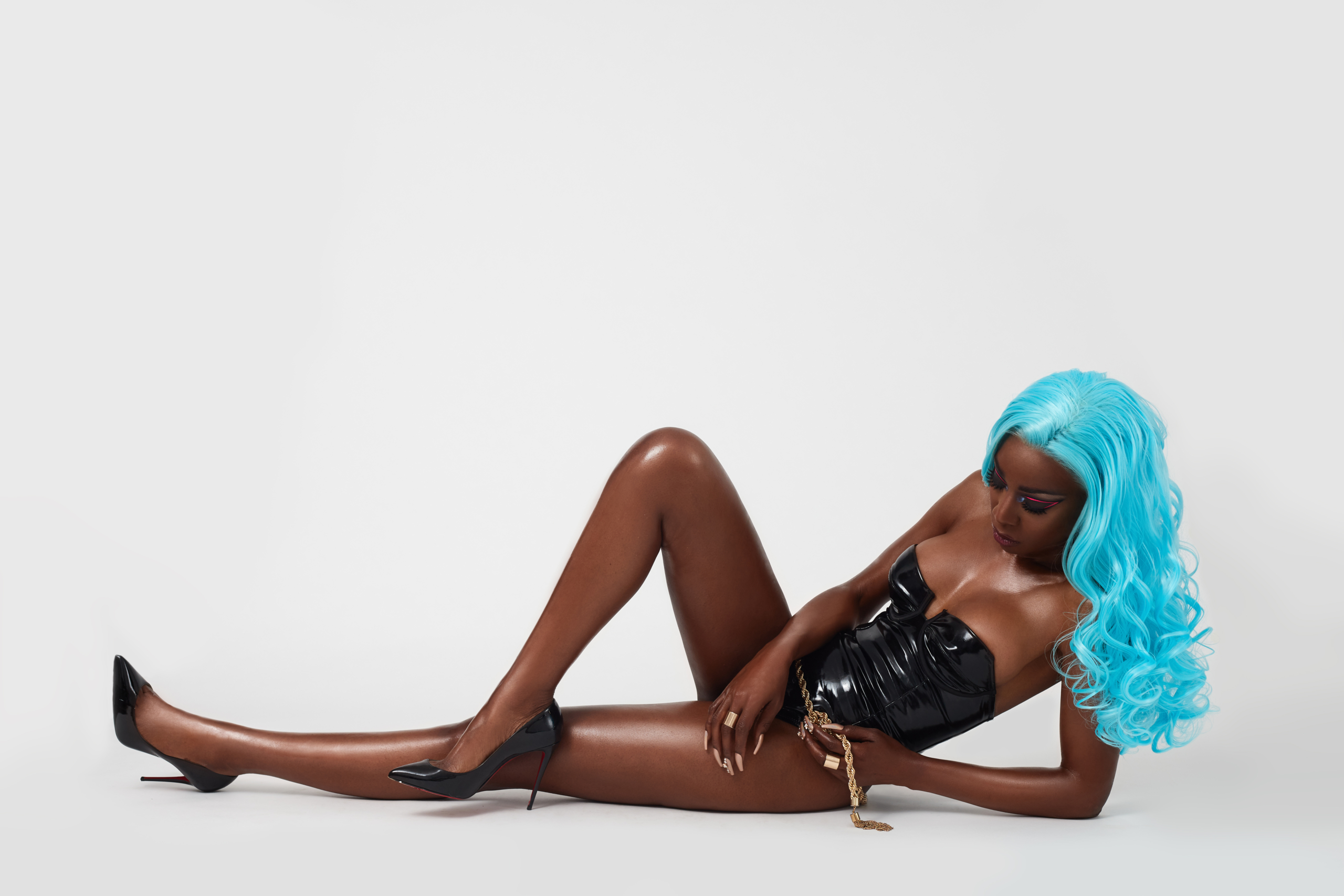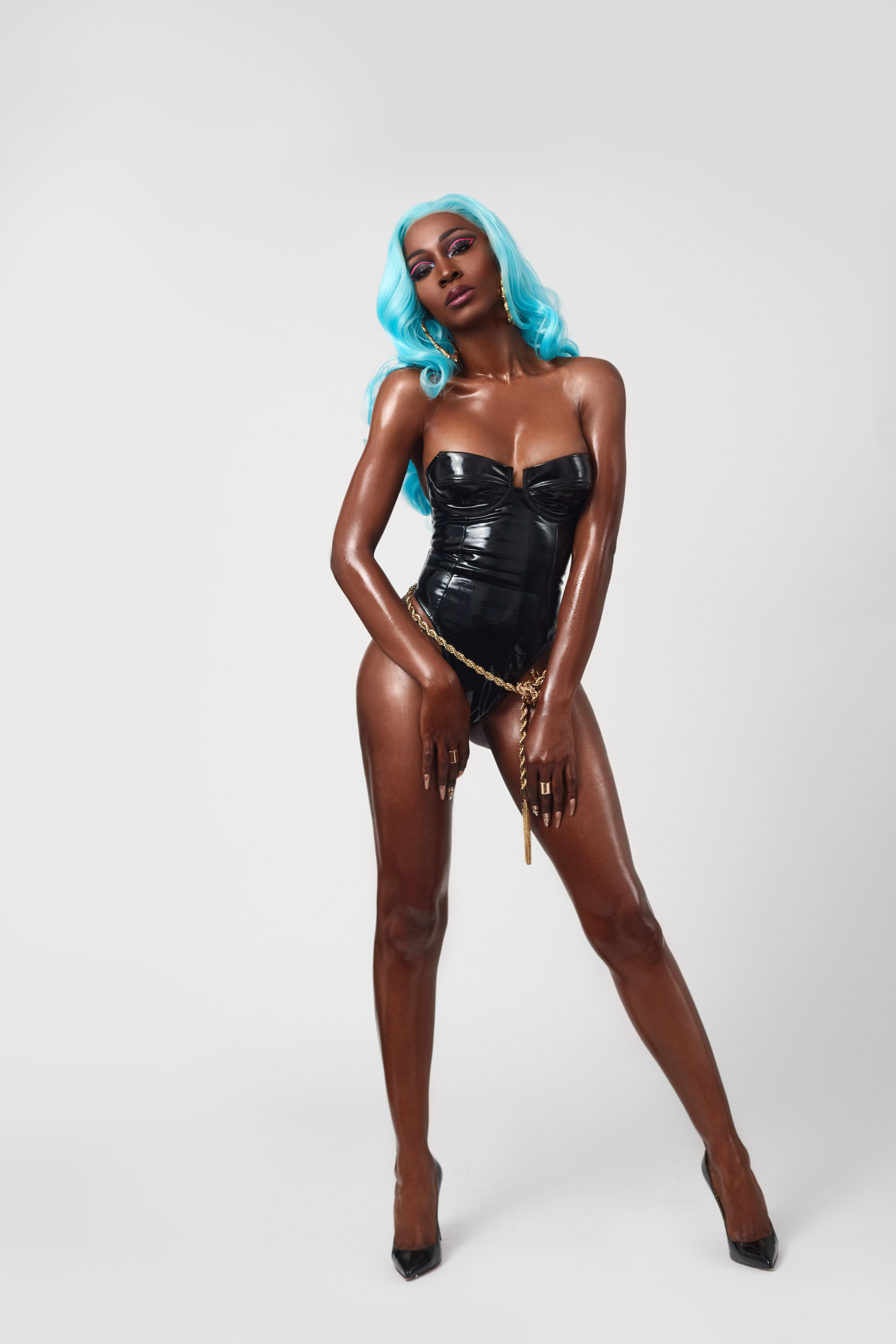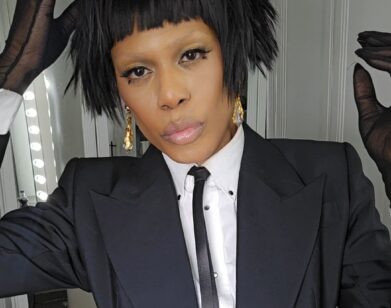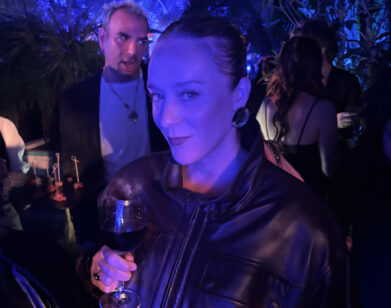“I Was Born for This Time”: Angelica Ross Is Black, Trans, and Fearless
No justice, no peace. No justice, no party. Pride month has looked a little different this year, but for Angelica Ross, the actor, activist, CEO, and adored leader of the LGBTQ community, justice has been a lifelong fight. Ross first appeared on Ryan Murphy’s Pose as Candy Ferocity, a character equal parts glamour and power, followed by a turn on the latest season of American Horror Story as Camp Redwood’s undercover nurse and resident ghost-storyteller. With her portrayal of the tragically-fated Candy Ferocity, the actor pushed forward visibility for the trans community, not only in Hollywood but in the social conscience of America. Though her strides in the entertainment industry are historic, with Ross becoming the first female transgender actor to secure two series regular roles for Pose and AHS: 1984, Ross has also spent most of her off-days working to make the world a better place for trans folks to thrive.
In 2014, she founded TransTech Social Enterprises, an organization dedicated to servicing trans people in the tech industry, with multiple goals in mind: “Getting herself off the streets,” as she puts it, and creating more opportunities for her trans sisters and brothers. “I’ve received I don’t know how many awards for being a Black trans woman or the work that we’re doing with TransTech, but I have received very few checks to support the movement.” Throughout the month of June, she spent her time doing as many Zoom calls, panel discussions, and Pride events she could possibly attend (virtually, of course), quickly emerging as one of the loudest and fiercest voices in the Black Lives Matter movement. As she discussed with the writer Raquel Willis, a fellow trans activist, the month smelled more like a revolution than rainbow flowers. Nevertheless, Ross and Willis took time out of their loaded schedules to reflect on the evolving nature of Pride, the inherent spirituality of the trans journey, and the 39-year-old actor’s liberating embrace of her sexuality. —ERNESTO MACIAS
———
RAQUEL WILLIS: Alright, Angelica. How are you doing?
ANGELICA ROSS: I am slightly exhausted. I just woke up from a nap, but I basically just have to figure in naps into my days because I’ve been hopping on every Zoom call, panel, town hall, Pride event, and Black Lives Matter discussion that’s been happening on the internet.
WILLIS: I completely feel you. We’re in an unprecedented moment of unrest and people fighting against white supremacy and police brutality, then Pride month. Did you expect Pride month to be so wild this year?
ROSS: I did not. I thought that Pride month was really going to be kind of low-key because of COVID-19 and us being suggested to stay inside our homes and social distance. With the Black Lives Matter protests against police brutality bringing us back into the street, I think that we’re seeing the origins of the Pride movement: a riot. We’re seeing that happen all over again, within the context of the intersection of being Black and being LGBTQ.
WILLIS: I think it’s so perfect, just thinking about some of those historical figures that we always talk about and invoke each year. Marsha P. Johnson and Sylvia Rivera. Does it feel like we’re in the middle of a revolution to you? Because it kind of feels that way to me.
ROSS: I feel like we are definitely on the heels of another revolution. One that has finally caught the attention of white people, who we actually need to address racism because it is their problem to address, that they’ve created. I think the tipping point has been the fact that with technology and the internet, we now see all of it. You can’t turn away from the police brutality because as you scroll down your timelines on any social media feed, people are starting to share it on all their accounts. Even celebrities who don’t want to mess up their pretty layouts on their Instagram feeds are starting to share it.
WILLIS: You’re definitely one of the celebrities who embodies so many different roles, particularly in the Black trans community. What are some of the ways that you have been using your platform in this time to elevate the voices of other folks in our community?
ROSS: It’s been interesting because we all have been affected, in some way, by COVID-19 and by the shutdown that’s been happening across the country. I’m not filming American Horror Story, I’m not filming Pose right now. I prioritize my time with my organization TransTech Social and using my platform to show that there are voices other than mine that are brilliant, like yours, which I shared with Hilary Swank’s Instagram audience when I took over her social media for the Share The Mic campaign. I brought on other people, like Ashlee Marie Preston and Precious Brady Davis, and so many different people.
WILLIS: I think it’s been an opportune time, particularly for Black women, to really reap some of the privileges that white women with platforms have had for so long. For a long time, it felt like many of us have been yelling into the void, and now it’s like, white cis people are living in the moment of transformation for themselves, about how they wield their privilege over more marginalized folks. What is so inspiring about you is that you have always pushed not only your career in entertainment, but also for others in tech. Could you talk a bit more about the origins of TransTech Social?
ROSS: In the early 2000s, life for trans people was so drastically different. I was doing everything I could to avoid getting fired from another job. I had been fired job after job between the years of 1999 and 2001. I found myself faced with the decision of needing to enter sex work in order to survive. For this very short period of time, I found myself in the adult industry, posing for websites and things like that. The woman who I was going to be working for on the website realized that I was tech-y. She asked me, instead of posing on the website, if I would be willing to be the webmaster.
That was my first introduction to the fact that I could actually work behind the camera, instead of being exposed and exploited in front of the camera. It also then introduced me to the fact that I could see technology as a harm reduction strategy for the trans community, especially those who are dealing with sex work. I see it as an opportunity to get our community off the street and behind the screen. That was the origin; it was all about getting me off the street, getting me better opportunities. I started learning CSS and HTML and working on websites, retouching photos for models. I was learning from video tutorials online. No one, in the beginning, needed to know what I looked like or what I sounded like because it was freelance work. That was the blueprint that I then used to create TransTech.
WILLIS: I think what is so powerful about your story is that even before you became a superstar, you were really championing what it means to live in the glory of your leadership. I think that means so much to a community that has, for so long, obviously been sidelined and undervalued in a mostly white, cis-led environment in the LBGTQ+ community. Recently you made a post about how you struggled for a few years to get support for your initiatives. At this moment where we’re having so much of a reckoning, what are the ways that we need to prioritize Black, particularly trans, leadership?
ROSS: I think we need to continue to realize that Black people, since the beginning, have always been able to make a way out of no way. That’s where we come from—resilience. You’ve got to check in on your strong friends and the leaders. Check in on the folks, because so many times I’m making it look so much easier than it is. I had asked one of our partner organizations once if they would be a sponsor for the TransTech Summit. They had agreed. In the sponsorship agreement that we were making, they had put in there that they would do it if I would agree to be the keynote speaker at their next event. I pulled them aside and was like, “Okay, listen. If you really, truly are about that life, then let me point out that Marsha P. Johnson and Sylvia Rivera were doing sex work in order to fund STAR House.” This is an evolution of that, where I’m still using my body and selling my creative services in order to fund my organization and get my sisters help. For the past six years, I have experienced this virtue signaling and tokenization of Black trans people, especially those of us that are super visible. I’ve received I don’t know how many awards for being a Black trans woman or the work that we’re doing with TransTech, but I have received very few checks to support the movement.
I’m new Hollywood. It’s not like I get the same opportunities or pay that a white Hollywood actress, or even, let’s just say, Caitlyn Jenner gets. I think we’re finally understanding that so many Black trans people are doing way more work than some of these organizations that have the structure and budgets to do the work. There have been so many initiatives now to ship money and resources to these Black trans-led organizations, and I’m glad that we’re finally seeing that happen.
WILLIS: One thing that is so striking in your voice when you speak is the sheer confidence that you have. I wonder, what are the ways that you remind yourself of your power in the face of transphobia, in the face of racism, classism, all of these different systems of oppression that tell you that maybe you shouldn’t exist?
ROSS: I’m very fortunate to have been introduced to Nichiren Buddhism, and chanting “Namu Myōhō Renge Kyō” (“Devotion to the Mystic Law of the Lotus Sutra” / “Glory to the Dharma of the Lotus Sutra). Other folks, especially within the Black community, have been fortunate enough to see the movie What’s Love Got To Do With It, and to see Angela Bassett’s incredible portrayal of Tina Turner’s spirit. Especially those few scenes, where you see that Tina is at her wit’s end. Then a friend introduced her to chanting, and you can see at the beginning she doesn’t really know what the words are, then all of a sudden, she’s a speeding train, chanting backstage as she’s about to go on. She’s basically taking the power back in her life. That power to understand the life force that’s available within all of us. It’s just about tapping into this place where you’re no longer willing to be a victim of the circumstances. You’re no longer willing to run away from the challenges that keep popping up, and they’re popping up fast and furious right now.
I know that these challenges are like lifting weights. I know that since I was born, my path has been laced with these challenges that have been preparing me for 2020, which have been preparing me to stand up in this moment. My Buddhist practice kept giving me a foundation to believe that I was born for this time. I was born to show yet another example: a dark-skinned Black trans woman can show you how she can raise the vibrational frequency of her life to do something great for this world. It’s not specifically that anybody can do what I’m doing, but it is that anybody can fully blossom. Whatever fragrance you’re meant to bring into this world is what you’re meant to bring into this world, and you have every opportunity to uproot yourself and replant yourself in an environment that is affirming to your growth.
WILLIS: You better let them know.
ROSS: I know this to be true because it’s what I’ve done with my life. I was born in Racine, Wisconsin. I uprooted myself, and I’ve uprooted myself several times to replant myself into environments that were affirming for my growth. That is just what I’m trying to reflect to all of my brothers or sisters in the LGBTQ+ community, to not be disheartened by the political environment that we’re in right now, by the challenges they see around us. I want them to know that I know you were born for this.
WILLIS: That’s powerful.
ROSS: Think about it this way, Raquel. Everybody’s like, “Oh my goodness. Was I born in the wrong time?” Just fed up with the circumstances and not wanting to deal with it, and all this. But in 2020, there’s a Raquel Willis. In 2020, there’s a Noname. The essays you’ve written, the relationships you’ve built, the ripple effects—we need all of that right now. It really is important that every single person realizes that you are here to bear witness to this moment so that when we look back into the history books, we can be proud. Can you be proud of what you were doing at this moment and how you responded to this moment?
WILLIS: How would you describe how you felt maybe a year ago to now? What have been the things that you feel like have transformed your life or transformed within yourself in just a year? I know we’re in an unprecedented time. Sometimes we don’t have a chance to reflect on the most recent history.
ROSS: Look, we’ve had a lot of upsets, but we’ve definitely still have had a lot of progress. In a year’s time, I know that I prayed—because that’s really all I could do, was pray—that telling Candy Ferocity’s story would create such a ripple effect throughout the world, that the murders of trans women would end. I’ve been so heartbroken to the reality that it shows no signs of stopping. It has been such a roller-coaster because I’m experiencing some of the highest highs and some of the lowest lows that I’ve ever experienced. It’s like, I’ll be featured in Essence magazine for Black women in Hollywood, and another Black trans woman is killed. I’d have some other historic win as a Black trans woman, more visibility, or another milestone in my career, and then another Black trans woman is killed. I feel like I’m on a seesaw and it feels difficult at times to celebrate my wins when so much is going on around me.
I think that is what is so radical about Black excellence—that we defy all of that and, in the face of our oppressors, we’re still able to not only find moments of joy, but show up and kill shit, basically, is what India Arie said. I think white America is now waking up—if they haven’t already—to the mediocrity. Of course you seem great, because you’re the only ones who have been let in the room. But once you let this other talent into the room, you’re going to have to step up your game.
WILLIS: Absolutely. What has your journey into owning your sensuality been like as a Black trans woman?
ROSS: Owning my sensuality has been quite a journey as a Black trans woman, because I’ve personally had a stressful relationship with my body, with not loving it in the beginning, feeling like the world is just rejecting it. As I started transitioning, my body was attractive and entertainment for this sub-sect of men; I found myself to be very desirable and experienced assuming privilege very early on in my transition. In the beginning, I felt like my sexuality and pleasure were not my own. It was performative for men, especially men who would pay me so I could keep the lights on. I was someone that was with men who were looking for pre-op trans women, yet I’m a pre-op trans woman who’s not really interested in engaging in my body in those ways. As my life changed and I started reaping other opportunities, and didn’t have to do sex work, I didn’t have to deal with men. I love men and I’m attracted to men, but I was engaged to be married in 2005, and I called the engagement off in 2006. I have been single ever since and am learning to deal with men on my own terms. Now that I actually don’t need your money, I don’t need anything from you. What I want from you is companionship. What I want from you is respect. What I want from you is for you to treat me like the woman I know I am.
Now, even as I’ve been able to have my gender confirmation surgery, that has been a whole new chapter of my sensuality because before, I couldn’t even stand in front of a mirror naked. I couldn’t walk around my house naked with no one around. I had to always keep myself concealed, even from myself. For me, being able to be in my body in the ways that I identify, to have my body affirm my identity from the inside out has only made me feel sexier. It’s also made me feel more special, in the sense that it’s taken me a long time to get here and it’s cost me a lot. I can’t just let any man come in and take what I have worked so hard for. Black trans women have given so many Black men their trust and have been betrayed. I only deal with men who can deal with me out in the open. It’s not that I want paparazzi and folks knowing that Angelica Ross is dating this person, but if you can’t be out in the open with me at a restaurant or if you’re just trying to Netflix and chill at my house, it’s just not going to happen. Where I am with myself works right now. I will not allow myself to engage with someone that is just not worth it for me.
WILLIS: That makes so much sense. I also am post-op—even these terms, even the language that we have to use, it feels so dated, in some ways. Maybe in this new era, we’ll have other language to talk about these things. There’s something important about being an empowered Black trans woman in this time, who can, regardless of whether she’s had any kind of medical transition, find the importance and the pride in naming and stating her trans experience.
ROSS: Absolutely.
WILLIS: You know, you’re a big sis, honey. You know how it was back in the day. For a lot of people, the goal was: “Maybe if I have bottom surgery, then I won’t talk about this anymore and I won’t have to worry about this anymore. I can just discard this actually really powerful and insightful part of my experience, and just be human.” I think we are a different generation, in the sense that we’re saying amidst the threats of violence, discrimination, and maybe even the possibility of not finding love in a world that isn’t ready for us—we’re still going to name and state our trans experience because it is powerful and beautiful, whether our lovers get it or not.
ROSS: I hear that from a lot of trans women who end up having the gender confirmation surgery, maybe shortly after they end up shaving or cutting all their hair off. It’s part of the full transition. There are so many things that we have to learn to be safe, to perform our femininity: have long hair, have a socially acceptable appearance when it comes to your expression as a woman. In the beginning, it was hard to take off my hair and still see the woman that I see in the mirror, or to take off the makeup and to just be bare bones. Back in 2010, when I quit my job at the Kit Kat Lounge as a showgirl, I had long, relaxed hair. I ended up cutting it off. I wanted to be able to see that I was beautiful, to see the woman in the mirror without everything else, that I didn’t need all of those other things. Now, I’m in a place with my womanhood where whether it’s a lace-front wig or whether it’s not, it’s all divine play to me. They’re all accessories, but none of that stuff defines me or my womanhood.
WILLIS: There’s something so powerful about us being in a moment where our identity isn’t so wrapped up in this notion of the adornment. There’s literally an essence to who we are, as Black trans women. It’s not about the accouterment. It’s really about the actual fact of our lives, the fact of our experiences, the beauty of transformation. And it’s not just physical.
ROSS: It’s spiritual.
WILLIS: Right? And thinking about the ways that you connect to Buddhism, there is this a spiritual aspect to transness that I think is actually a window of the possibility that other folks could tap into.
ROSS: I think being trans is an unspoken spiritual path. I feel like it’s an impulse that starts in the heart that tells you that it’s time to change. It’s time to peel off another layer of skin. It’s one of those things that is automatic, but it’s also one of those things that is incredibly challenging without a spiritual foundation. If you are going through this kind of transition and you are focused on the daily physical changes, and “Do I pass today?”—your emotions are connected to your physical transition. You will learn a lesson: that kind of physical change is going to take your emotions on a ride. You’ve got to get to a place where the one thing that never changes is that hopeful spirit that knows in your heart who you are without needing any label.
The only way, I believe, to take full advantage of this transitional experience is to recognize it’s not just for your own personal gain, but that your transition is actually meant to inspire the people around you who can’t even change their mind. When you change your entire life, that is equivalent to a book, a chapter in the Bible. I know about the Book of Raquel, the Book of Janet [Mock], the Book of Laverne [Cox], and the Book of Angelica. These are amazing stories of transition. Whether we name it or not, it’s like a spiritual parable, when you talk about the challenges, and how we each mustered up the spirit and the courage to move forward.
You got so much stuff, girl. Like Oprah would say, “Your future is so bright, my eyes are blinded.” Because I can see it. I know what I was given 10, 15 years ago—and the world wasn’t even like this. The fact that you are burning as bright as you are right now, I’m absolutely excited about our future because of young trans folks like you.
WILLIS: Thank you so much. We were talking about this when you were doing the live series for Share The Mic. I was saying how I remember seeing you and just being in awe of the fact that you were this Black trans woman who was successful and beautiful, and articulating our experience in a very matter-of-fact way. Here we are. I think about seeing you on Tumblr—what that meant to me, as someone who had just left college, even just seeing that glimpse of possibility in you for me. How that sustained me just a little bit longer to find the voice that I needed.
ROSS: Even though things are really challenging, even though it seems like we take two steps forward and five steps back, we are still moving this thing forward and we’re gaining the momentum with it, and it is going to be worth it. None of our work is going to be in vain. None of our sisters’ and our brothers’ lives who we have lost will be in vain. Their work, their lives, will mean something.
———
Styling, hair, and makeup: Amiyah Scott

